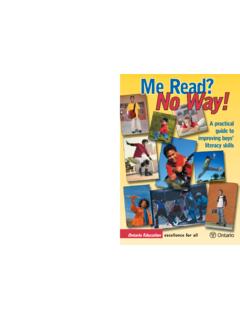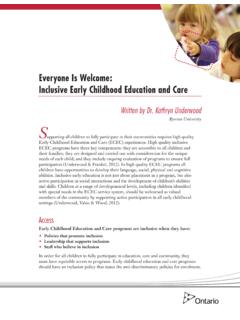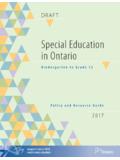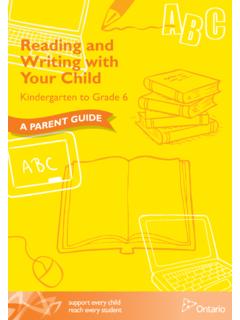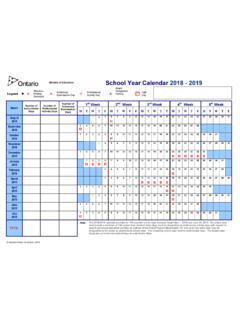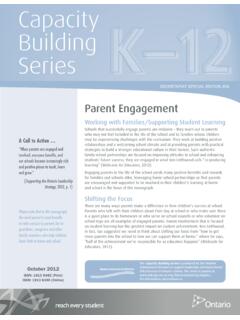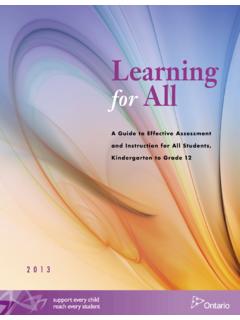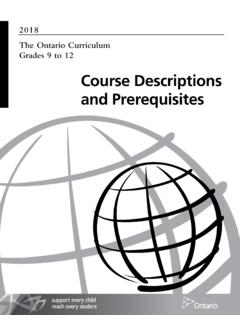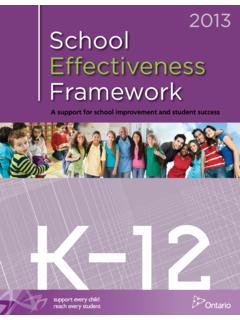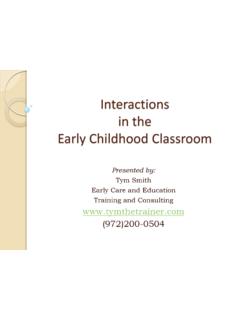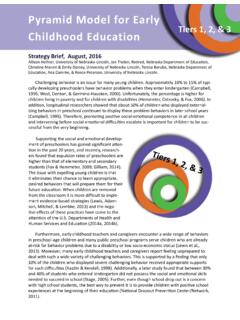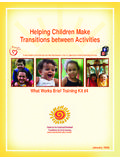Transcription of The Full-Day Early Learning – Kindergarten Program
1 TheFull-DayEarlyLearning KindergartenProgram2010-11 DraftVersionINTRODUCTION1 The Full-Day Early Learning Kindergarten Program : Vision, Purpose, Goals1 The Importance of Early Learning2 Foundations for a Healthy School3 BUILDING A Learning COMMUNITY6 The Child as Learner6 The Role of Teachers and Early Childhood Educators7 The Role of Parents8 The Role of Principals 10 The Role of Community Partners11 TEACHING/ Learning APPROACHES12 The Role of Play in the Full-Day Early Learning Kindergarten Program13 Play-Based Learning : Learning Through Inquiry14 Play-Based Learning : Learning in Real-Life Contexts 16 Language Development and Literacy18 Early Numeracy Development20 THE Learning PROGRAM22 Areas of Learning , Developmental Domains, and Big Ideas 22 The Learning Expectations22 interactions 24 ASSESSMENT, EVALUATION.
2 AND REPORTING28 The Evaluation of Overall Expectations29 Principles Underlying Assessment and Evaluation29 Methods of Assessment and Evaluation30 Reporting32 SOME CONSIDERATIONS FOR Program PLANNING33 Developmental Considerations for Children 33 The Learning Environment35 Program Considerations for English Language Learners37 Planning Programs for Children With Special Education Needs39 Equity and Inclusive Education 41 The Role of Information and Communications Technology 42 CONTENTSUne publication quivalente est disponible en fran ais sous le titre suivant : Programme d apprentissage temps plein de la maternelle et du jardin d enfants, 2010 2011. Version publication is available on the Ministry of Education s website, at and Safety43 Environmental Education 43 Healthy Relationships 44 Critical Thinking and Critical Literacy 45 The Role of the School Library 46 THE Learning AREAS.
3 Program EXPECTATIONS49 Personal and Social Development50 Language68 Mathematics92 Science and Technology112 Health and Physical Activity128 The Arts140 The final edition of this document, to be released in 2011, will replace The Kindergarten Program , 2006 (Revised)when the Full-Day EarlyLearning Kindergarten Program is fully implemented across the in September 2010, all new Full-Day Early Learning Kindergartenprograms will be based on the expectations outlined in this draft edition of the Learning is part of our overall plan to help more childrenget a strong start in school, so they can go on to have successful,rewarding lives. By giving them more opportunities at a young age,we re giving our children a brighter Dombrowsky, Minister of EducationThe Full-Day Early Learning Kindergarten Program is a child-centred, developmentally appropriate, integrated, extended-day Program of Learning for four- and five-year-old children.
4 The purpose of the Program is to establish a strong foundation for Learning in the Early years, and to do so in a safe and caring play-based environment that promotes the physical, social, emotional, and cognitive development of all goals of the Full-Day Early Learning Kindergarten Program are as follows: to establish a strong foundation for the Early years by providing young children with an integrated day of Learning to provide a play-based Learning environment to help children make a smoother transition to Grade 1 to improve children s prospects for success in school and in their lives beyond schoolThe Full-Day Early Learning Kindergarten Program is based on the understandingthat children develop within a complex set of interrelated systems that includesthe family, the school, the broader community, and the world. Although earlylearning programs have traditionally acknowledged the importance of these systems,they have tended to address each one separately, in terms of its individual impacton the child.
5 By contrast, the Full-Day Early Learning Kindergarten programrecognizes the importance for the child s development of the interrelationshipsbetween and among these systems, and builds on those interrelationships. Holdingthis interconnectedness at the centre of its vision, the Program sets children on a more positive trajectory for Learning . INTRODUCTIONFAMILYSCHOOLCHILDSCHOOL COMMUNITYWORLD FAMILY COMMUNITY WORLDTHE Full-Day Early Learning Kindergarten Program :VISION, PURPOSE, GOALS Introduction1 The Full-Day Early Learning Kindergarten Program reflects the belief that four- andfive-year-olds are capable and active learners, full of potential and ready to takeownership of their Learning . It approaches children as unique individuals who live and learn within families and communities.
6 The Program aims to provideevery child with the kind of support he or she needs in order to develop: self-regulation health, well-being, and a sense of security emotional and social competence curiosity and confidence in Learning respect for the diversity of his or her peersPrinciple 1: Early child development sets the foundation for lifelong Learning ,behaviour, and s Early Learning experiences have a profound effect on their Early interactions directly affect the way connections are made in thebrain. Early Learning experiences are crucial to the future well-being of children,and establish the foundation for the acquisition of knowledge and skills that willaffect later Learning and experience in a child s Early life has an impact on his/herdevelopment now and in the future. Parents and families are the first and most powerful influence on children s Early Learning anddevelopment.
7 Young children and their families live in communitiesthat shape Early experiences.(ELECT, p. 4)Fundamental PrinciplesSix fundamental principles guide the Full-Day Early Learning Kindergartenprogram. They are based on the six overarching principles developed by the BestStart Expert Panel on Early Learning for its report outlining a framework forOntario Early childhood settings entitled Early Learning for Every Child Today(January 2007, pp. 7 20; hereafter referred to as ELECT ). The principles reflect beliefs, values, experience, and current research findings (p. 5).The six principles are as child development sets the foundation for lifelong Learning , behaviour, and with families and communities strengthen the ability of Early childhood settings to meet the needs of young for diversity, equity, and inclusion are prerequisites for honouring children s rights, optimal development, and planned curriculum supports Early is a means to Early Learning that capitalizes on children s naturalcuriosity and , responsive educators are IMPORTANCE OF Early LEARNINGThe Full-Day Early Learning Kindergarten Program2 Four- and five-year-old children arrive at school as unique individuals shaped bytheir particular cultural and social backgrounds and day-to-day experiences, andat different stages of development.
8 Their Early experiences with school are ofparamount importance. Children will thrive within classrooms that meet theirdevelopmental needs and that provide a secure, respectful, and nurturing environment. An Early Learning Program can meet these needs, and provide an environment conducive to Learning , only if it is culturally, linguistically, anddevelopmentally appropriate. expectations should be challenging but attainable,and the Learning environment needs to reflect the social and cultural context inwhich each child is developing. The Program should be flexible enough to respondto individual differences and to make children feel comfortable in applying theirunique ways of thinking and give each child the best start possible, it is essential that Early Learning programsprovide a variety of Learning opportunities and experiences that are based onassessment information and the strengths, needs, and interests of the Early Learning programs are critical in laying the foundations for success inlearning, the Early years are also an important time in children s total , Early childhood educators, members of the community, and familiesshould work together to provide challenging and engaging Learning experiencesthat will build children s confidence, encourage them to continue to see learningas both enjoyable and useful.
9 And provide a strong foundation for their futureintellectual, physical, and social Full-Day Early Learning Kindergarten Program must provide children witha safe and healthy environment for Learning . In addition, children s Learning in theearly years helps them make informed decisions about all aspects of their healthas they develop and encourages them to lead healthy, active lives. This Learning is most authentic and effective when it occurs within the context of a healthy school. The implementation of the Health and Physical Activity strand in theFull-Day Early Learning Kindergarten Program is a significant aspect of ahealthy school Ministry of Education s Foundations for a Healthy School ( ) identifies four components that together represent a comprehensive approach to creating ahealthy school. This approach ensures that children learn about healthy, activeliving in an environment that reinforces their Learning through policies and programsthat promote healthy, active living.
10 The four components are as follows: high-quality instruction and programs a healthy physical environment a supportive social environment community partnershipsHigh-Quality Instruction and ProgramsThe Full-Day Early Learning Kindergarten Program provides children with a wide range of opportunities to learn, practise, and demonstrate knowledge and skills in all areas of Learning . It lays the foundation for children s smoothtransition to Grade 1 and for success throughout their school order to ensure high-quality Full-Day Early Learning Kindergarten programs,it is important for Early Learning Kindergarten teams and school administratorsto participate in focused professional Learning FOR A HEALTHY SCHOOLI ntroduction3A Healthy Physical EnvironmentThe physical environment can affect both conditions for Learning and opportunitiesfor physical activity and healthy living.
